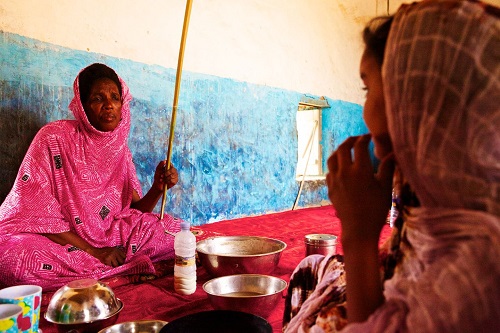pinterest photo
By
Shelley Grierson
In North-Western Africa, south of the Western Sahara, lies Mauritania. It is a land steeped in history, with a nomadic and very tribal ancestry. Today, Mauritania is home to around 5 million people, almost 100% of which are practising Sunni Muslims. Atheism is punishable by death, and both slavery and child marriage are still practised. In addition, women are increasingly sent by their families to ‘fat farms’ in order to gain extreme amounts of weight.
Nomadic traditions still lie at the heart of the socio-cultural practices of Mauritanians. In generations gone by, obesity was a sign of wealth in a population of meagre resources and constant famine. Nowadays, this practise continues, with young girls being sent to ‘fat farms’ – by their own families – in the hope of securing them a husband. Although most men in Mauritania are, by Western standards, very underweight themselves, their desire for obese wives continues to drive a trend that is unhealthy at best, and life-threatening at worst.
Young women are often beaten and force-fed to ensure they gain vast amounts of weight in the short periods of time spent at the fat farms. Often, they are tricked by family members and have no idea where they are being sent, or why. Many are told that they are going to a summer camp, and will return more beautiful. The matrons running the fat camps use various methods of abuse to ensure that weight is gained. These include beatings with canes and sticks being forced between toes to encourage girls to comply.
The ultimate turn-on for Mauritanian men are stretch marks on a woman – and stretch marks on the arms most of all. In order to achieve this, calories consumed at these fat camps can exceed 16,000 per day – more than 8 times the recommended calorie intake for most females and more than four times that of a male bodybuilder. Not only are they forced to consume huge amounts of calories constantly throughout the day to ensure weight gain (and to achieve the ultimate goal of stretch marks), but the meals themselves are often inedible.
The practice of leblouh (or force-feeding) involves vast quantities of camel or goat milk, gruel, dates, peanuts and oil. A typical stay at a fat farm usually involves around 3 months of leblouh and very little physical activity. Often, the farms are run in remote areas where the girls have little chance of escape. With the average girl aged between 7 and 14, they are often too young to do anything other than comply. If a girl attempts to escape, or refuses to follow the extreme daily feeding schedule, she is beaten.
With the matrons being paid healthy bonuses to ensure each girl gains significant amounts of weight at their camp, it is a relatively lucrative trade. Some even receive bonuses if the girls develop stretch marks. Typically, only wealthier families with disposable income can afford to send their daughters to such camps. The preparation of their daughters for marriage is a very important step in the Mauritanian culture.
Obesity in itself is linked to a number of other side effects, including hypertension, type II diabetes, depression, anxiety, stroke and heart disease. On one hand, the women of Mauritania are encouraged and rewarded for living a life of obesity, on the other, it is a life fraught with health issues. In the more Westernised big cities, some Mauritanian women disagree with the practice. For those that have exposure to Western ideas of feminine beauty, the idea of living a life of limited movement and one plagued by health issues, simply isn’t appealing.
Despite the waves of opposition, larger political movements have swayed in the opposite direction. The trend is on the rise, due to increased support for the reinstatement of more conservative and traditional values. What does this mean for the women of Mauritania? Until greater educational initiates can be implemented to highlight the dangers and health implications of obesity, they will continue to remain at the mercy of the male ideal of the ‘perfect woman’. Local authorities continue to turn a blind eye to the harmful and cruel practice of leblouh and it is believed that being slim as a female brings shame to the family as well as the village.
Ultimately, for the women of Mauritania, beyond being a life-threatening and horrific practice, it is also a case of extreme mixed-messaging. Men in their society consider women of extreme weight as highly attractive, and family members encourage and facilitate extreme weight gain for this reason. They are taught that very big is very beautiful. Yet increasingly, educators warn of the dangers of obesity, which directly negates their cultural beliefs surrounding obesity. More often than not, it is against the wishes of the women or girls involved, and encouraged by her family or the family of her betrothed. With her ‘best interests’ in mind, actions inevitably favour the preparation for a favourable marriage to a man who finds her attractive.
Shelley Grierson
Shelley Grierson is educated in Psychology, and is currently writing her Masters thesis on the topic of obesity. Shelley has close ties with Western Africa and has been involved in charity in the region since 2011. Shelley writes articles and blogs on her passions Psychology, Health and Digital Marketing. Shelley is based in the UK Shelley where runs the Marketing team for vidbuild.
References
‘Women fight Mauritania’s fattening tradition‘ – CNN – Oct 12, 2010
‘Girls being force-fed for marriage as fattening farms revived‘ – The Guardian – March 1, 2009
‘Mauritania’s ‘wife-fattening’ farm‘ – BBC – Jan 26, 2004



This has been well known for awhile. There are many outside of Mauritania who also find the practice beyond intriguing, downright appealing. May want to look into fantasyfeeder.com and feabie.com.